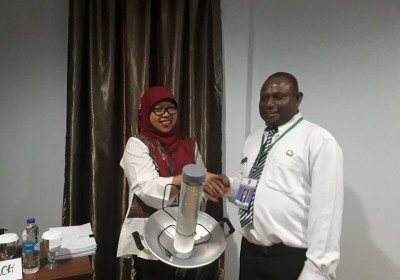Bolic Wok Brings Internet to Villages in Jayapura
May 23, 2018
Gustaf Griapon after delivering a presentation on Bolic Wok program. Photos: personal documents
The shape is like a regular frying pan that is usually found in the kitchen, of course without burning on the base. But this is not a common frying pan. With a paralon pipe attached to its center and a USB Wireless and cable installed, the wok turned into a device that can strengthen internet signal. That's a bolic wok.
It is Gustaf Griapon, the Head of Information and Communications Technology from the Jayapura District Office of Communications and Informatics (Kominfo), who invented the usage of bolic wok to capture the frequency of Wi-Fi signal. A bolic wok is not only more stable, but also easy to make and highly affordable to people in Papua.
Initially, as quoted on the official page of Jayapura District Government, the installation of a free internet network through the VSAT was only carried out at six points. Those locations include the Office of the Kominfo and five villages, namely Asey District, Sentani Timur, Sosiri and Yakonde Ebungfau, Tablasupa in Depapre District, and Nimboran District. Thanks to the Bolic Wok, more villages in Jayapura can access free internet at relatively good speed.
The easy access internet access is the main infrastructure that supports the application of Jayapura Village Information System (SIKAPUR). SIKAPUR is a government database application used to support the implementation of e-government. The District Government of Jayapura involves village, sub district and district governments in the process of data validation.
Not only that, the internet also makes it easy for people to pay taxes online.
"We also have 80 village websites," Gustaf said when interviewed last April.
Through this internet access, said Gustaf, village websites can function as potential promotion tools for their superior products in Jayapura. The people began to market their commodities online such as bath soap, cooking oil, lip softener, rubbing oil, massage oil, hand body lotion which is all made from coconut. Other commodities include bark paintings, as well as bags and leather wallets.
The next sectors which will be promoted through village websites include tourism, plantation commodities such as chocolate, and also fisheries. They plan to develop customary schools to teach culture and local wisdom of Papua and diving schools.
“Papua Batik is yet to promote on the village websites," said Gustaf.
To upscale the people skills, said Gustaf, Jayapura District Government continues to provide assistance and trainings, facilitated under cooperation with other parties. For example, they cooperate with the junior high schools and produce bolic woks to help meet the needs for internet antennas. A number of informatics and communication technology volunteers, local facilitators, leaders from related districts village operators have also been involved.
"To develop the news writing skills, I facilitate citizen journalism trainings so that the villagers can write the news well, besides the trainings to construct a village website," said Gustaf.
Gustaf's work and plans were compiled in a presentation titled "Implementation of Information Technology and Communications Based Village Development Project in Jayapura District" when he participated at the Education and Leadership Training III for District Government of Papua. In the training, Gustaf achieved the highest score.
The effort to overcome regional disparities can not only be driven through top-down instruction but also through ideas that come from community level which are channeled bottom up to inform solutions. This bottom-up approach to reduce the existing gap is what the Indonesia Development Forum 2018 will try to develop.
Indonesia Development Forum 2018 was initiated by the National Development Planning Agency (Bappenas) of Indonesia and Australian Government through Knowledge Sector Initiative (KSI). This year's IDF peak event will be held on July 10-11 and will bring up the theme of "Breakthrough to Overcome Inequality among Areas throughout the Archipelago". IDF 2018 will explore various key issues and challenges in the effort to tackle the economic and human development gaps in various regions of Indonesia. The result will be a recommendation for the National Medium Term Development Plan (RPJMN) 2020-2024. ***
Indonesia’s Research Institutions Supporting the Development of the Electric Vehicle Industry
Indonesian Muslim Fashion and Cosmetics IKMs Shine at Dubai World Expo 2020
Govt Steps Up UMKM Transformation Efforts in the Midst of Pandemic Slowdown
Govt Encourages Promotion of IKM Products in Digital Era
Government Begins Developing Maritime Training Center in Makassar
Tweets by IDDevForum
